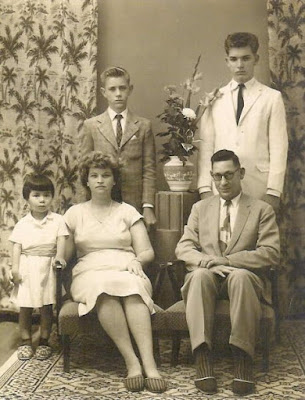In September 1947, my maternal grandparents got married in Mexico because it was illegal for them to marry in the United States. My grandmother was an immigrant from the Philippines and my grandfather was an American. From 1913-1948, 30 out of 48 states banned interracial marriage and it wasn't until 1967 that the U.S. Supreme Court ruled all anti-miscegenation laws unconstitutional.
My grandparents made a life for themselves in Louisiana, eventually having seven children. My mother, born in 1949, was the oldest. Her features were more South Asian-looking than Caucasian. She tells stories about the 1950s, when other children used to chase her and throw rocks at her calling her "N!gger" because of her dark skin.
From 1942-1945, 120000 people of Japanese descent living in the U.S. were removed from their homes and placed in internment camps. In the early 1960s, my paternal grandparents, my uncle and my father moved to Japan when the army stationed my grandfather there. They decided to adopt my aunt from a Japanese orphanage, and when they discovered a year later that she had a biological brother, an orphan being raised in a Buddhist monastery, they adopted him too. When the family was re-stationed back in the U.S. in the mid-1960s, my grandmother's sister would no longer speak to her because she "didn't trust the Japanese" and her distrust extended to her five and seven year old niece and nephew.
In September 2001, I came to Washington for the first time and stood in the exact spot where Martin Luther King Jr. delivered his "I Have a Dream" speech 38 years earlier, looked out over the Mall, and got goosebumps.
In January 2009, I stood at the WWII Memorial and watched Barrack Obama stand on those same steps leading up to the Lincoln Memorial, where I had stood and Dr. King had stood, and listened to him talk about change in America. Two days later, at the other end of the Mall, I listened to him again, this time taking the oath of office as our first interracial president. For two years people had been asking, "Is America ready for a black president?" The nation answered "yes".
In August 1963, Dr. King told us his dreams. "I have a dream that my four little children will one day live in a nation where they will not be judged by the color of their skin but by the content of their character...I have a dream that one day...little black boys and black girls will be able to join hands with little white boys and white girls as sisters and brothers."To Dr. King I say, dreams do come true. Maybe not in your all-too-short lifetime, but in mine, for my family, your dreams of racial justice have come true.






what a beautiful ending for the stories - thank you!
ReplyDeleteThank you, Margo. I lost a subscriber over this post, so it feels good to know someone responded to it.
ReplyDeleteFor the record, I am neither endorsing or condeming President Obama. I'm simply recognizing his election as a significant moment in race relations in America.
This is a powerful post. Racial injustice isn't over by a long shot, but in your grandparents' lifetime, the shift in public perception is astounding, isn't it?
ReplyDeleteHow very sad that your grandmother's sister couldn't accept children lovingly adopted by your grandparents. I wonder if it would be the same today for families who adopted Iraqi or Afghan orphans?
I'm surprised that you lost a subscriber over this post!